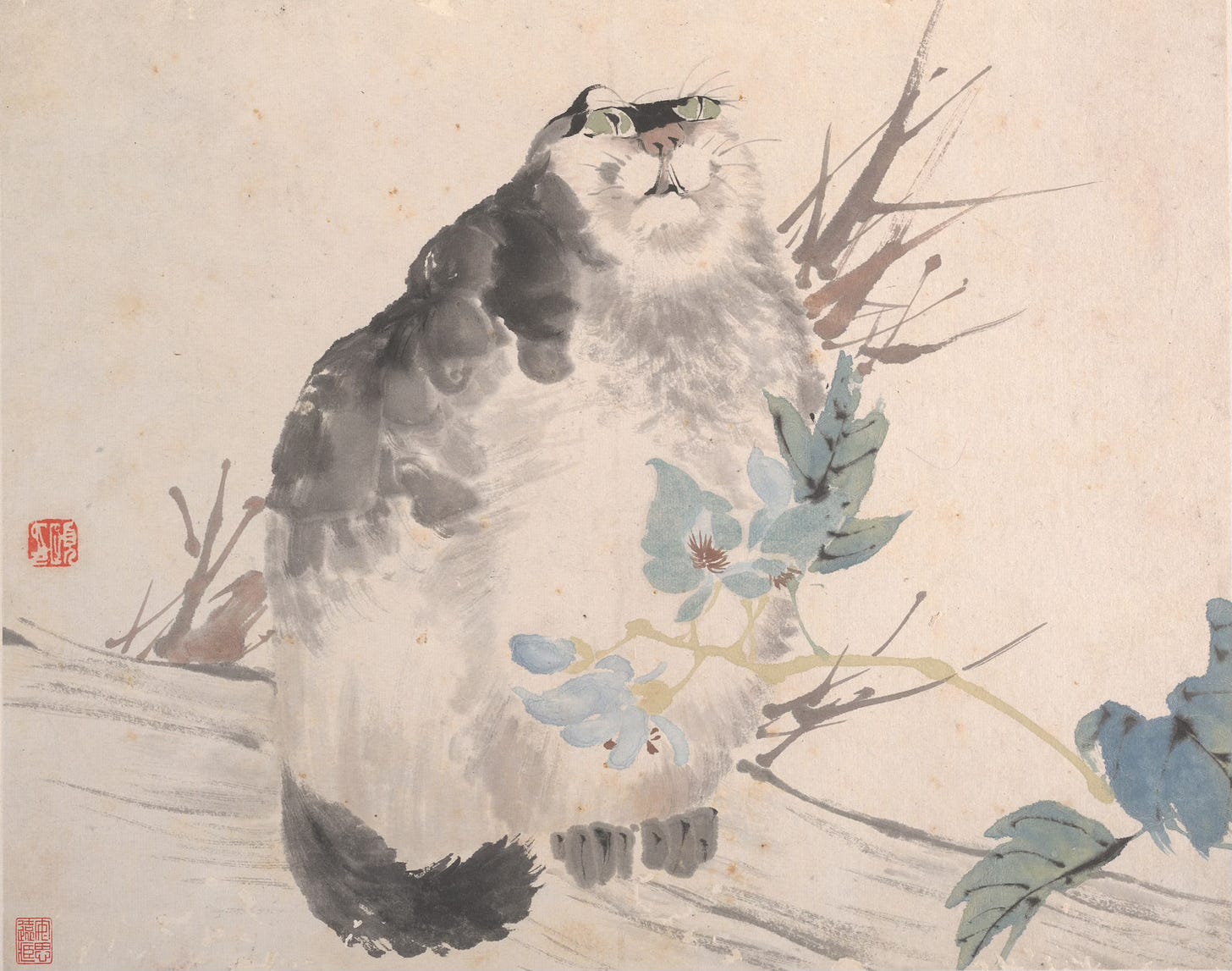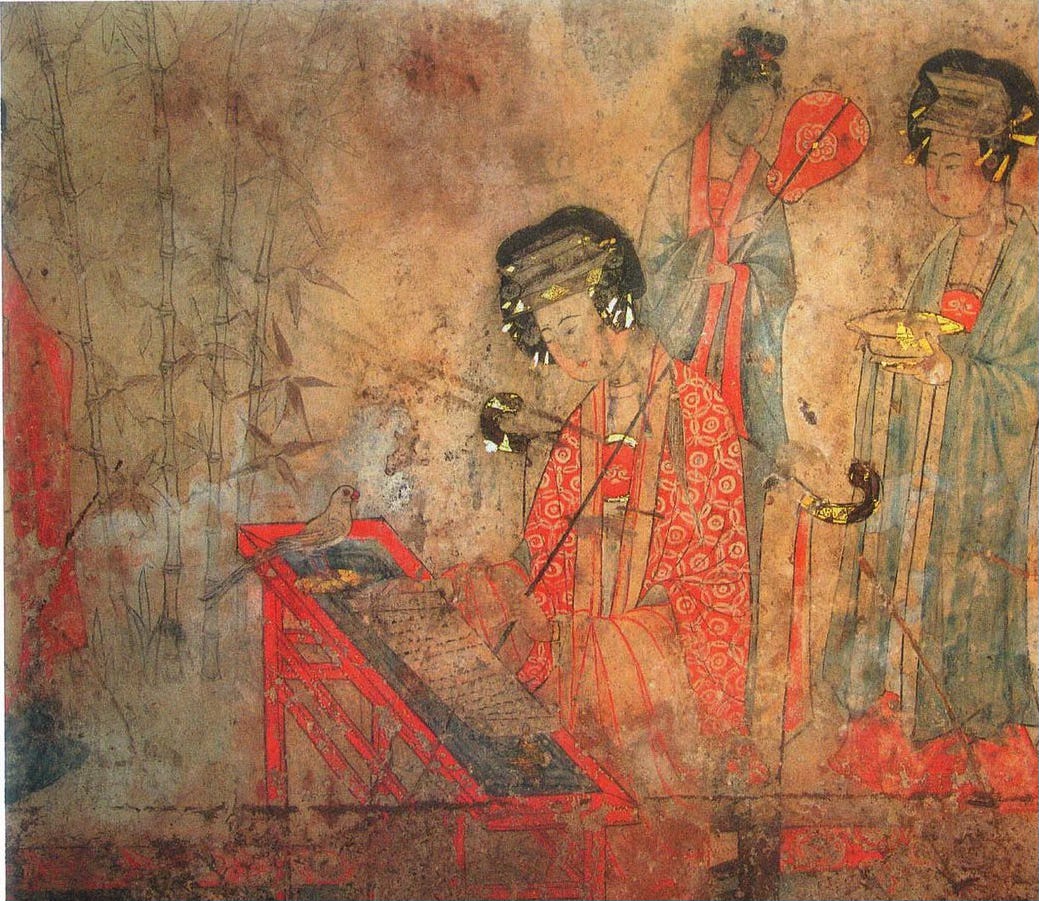
The discovery that it can be useful to have a tiny, occasionally friendly apex predator around seems to have come pretty late to China. Tang Buddhist monks, faced with the twin problems of mice and the no-killing thing, realized they could outsource the job to cats, whose karma was pretty bad on that front already. (Expedient means, baby!) By the 9th century or so it’s common to see even non-Buddhist sources talking about cats as having a “duty” (職) to guard grain and books from mice.1
Cats don’t start getting the proper degree of respect and admiration until the Song dynasty — which brings us briefly back to Lu You 陸游, from Sunday, for a couple appetizers before the main course:
赠猫三首 · 其一
”Three Poems I Wrote For My Cat - I”鹽裹聘狸奴,常看戲座隅。
時時醉薄荷,夜夜佔氍毹。
鼠穴功方列,魚餐賞豈無。
仍當立名字,喚作小於菟For a bag of salt I engaged a cat.
Now I watch him bat his toys around on my seat.
On occasion and catnip he loses his mind,
and he hogs the blankets every night.
Back from the mouse-hole, the day’s work done,
He knows I’ll reward him with fish for a treat.
All that remains is to give him a name—
I think “Little Tygre” sounds right.
You know where this is going. Many have walked this path.
贈貓三首·其二
Three Poems I Wrote For My Cat - II裹鹽迎得小狸奴,盡護山房萬卷書。
慚愧家貧策勳薄,寒無氈坐食無魚。A bag of salt for a kitty-cat,
The kitty-cat for my books.
And shame I’m too poor for a better reward.
No pillow in winter, not even fish to eat.
“Pinknose,” another one of Lu You’s cats, landed a better deal:
贈粉鼻詩
For Pinknose連夕狸奴磔鼠頻,怒髯噀血護殘囷。
問渠何似朱門裡,日飽魚餐睡錦茵。My cat spends her nights ripping mice apart.
Bristling, spitting blood, she guards the grain.
By day she’s every inch the palace lady —
Full of fish and sleeping on silk pillows.
Another one of Lu You’s cats (unnamed, but innocent) was allegedly in breach of contract:
贈貓詩
For My Cat執鼠無功元不劾,一簞魚飯以時來。
看君終日常安臥,何事紛紛去又回?You haven’t caught any mice. I let it go.
The fish and rice were set out at the appointed hour.
I watched you drowse the day away — so now
What’s got you galloping madly everywhere?
The humans weren’t always so amused. The 18th-century writer and schoolmaster Shen Qifeng 沈起鳳 claimed to have gotten a student to practice writing bureaucratic prose by composing a formal declaration of war against a cat who was more of a lover than a fighter. I found out about this from Wilt Idema’s Mouse vs. Cat in Chinese Literature, which I recommend to the extremely interested, but the translation there is partial (he leaves out the declaration, which is the whole point of the exercise) and does not reflect what Prof. Idema must know, which is that the piece is supposed to be funny. Forget “supposed to be” — it is funny:
討貓檄 Kitty Delenda Est
My student Huang Zhijun is greatly devoted to his studies. He sits with maps to his left and histories to his right, like a king upon his south-facing throne surveying his realm, and to keep the mice from his books he acquired a cat whose tiger-striped coat made everybody think it must surely be a noble creature. But the cat took up a post beside the bookshelves and has stayed there ever since, lazing all day and thrumming in his throat like a Buddhist invoking the Holy Name, num-nam-namo-namo. This earned him the name “Boods” after somebody remarked on his piety.2
The mice and rats at least made a token effort to hide their tracks when they first saw Boods. But after a mouse fell from a rafter to the floor one day and Boods escorted it home with the utmost solicitude, no mouse in the household ever knew fear again. They started ganging up on Boods after that, surrounding him and swarming over him.
The mice were scrabbling over Boods’ back and shoulders one day when one of them actually bit him on the nose. The blood came streaming out, and I happened by just as Zhijun was about to go fetch some medicine for the wound.
“Catching mice is what people keep cats for in the first place,” I said. “If Boods can’t get rid of the mice, he’s derelict in his duties as a mouser — and if the mice are biting him, he’s a failure as a cat. Forget medicine — I prescribe a whipping!” I assigned him to compose a formal declaration of war against the enemy cat, to be edited by myself as necessary. The finished product read:
Generalis Murilegus “Boods,” charged with leading the war on mice, has shammed mercy and feigned humanitarian concern to mask his unbecoming timidity. He chants Buddhist scriptures with all the sincerity and understanding of Yang Gui-fei's parrot, aping all the while the self-abnegating piety of the truly faithful.3 He idles the day away beneath the flowers, turning a blind eye to the mice and their mischief, and lazes by night on a cool bamboo mat, never minding the enemy chewing through the walls.
So derelict has he been in his duty that the mice have put out the call for their comrades to join them. They mass like a clutch of demons surrounding their mother, swarming over his back and shoulders and tormenting him as incessantly as the sensual perceptions do a monk. Yet still Boods sits there, deep in meditation, blind and deaf to their mischief, a mere puppet to their will, never lodging a mewl of protest. Diffident and hesitant, his soft touch has only emboldened the wicked mice -- and earned his nose double-duty as a tooth-sharpening pad for his pains.
Could the King of Hell maintain his authority if he feared the demons? Can a general too scared to fight keep order among his own men? Offering up one’s own face in tribute to the enemy surely marks a new low in conciliation, enabled at every step by this cat and his utter dereliction of duty. Left to their own devices, the mice have run rampant and formed barbarian legions; to apply the traditional punishments to Boods at this pass were as useless as goading a pig or a sheep. Run him up a pole as an object lesson to any who might follow in his stead, and make a pantomime kylin of his false-advertising pelt. This is a time for the tiger-hearted — there can be no place for those who turn tail and run like rabbits.
Shen Qifeng comments: At Wanshou Temple there was once a Master Bin who deemed it “Humane” of the cat to let mice escape. Many have called that madness, not knowing that it was in fact the Buddhist Dharma. Compare a student of Confucius and Mencius, for whom the first order of business in any new position is to root out evil and promote the Good. Any official who draws a salary without fulfilling the responsibilities of his office is setting a disastrous example for the common people! The Buddhists might pardon Boods and his ilk — but under the law of the land he ought to be executed!
I wasn’t there and I didn’t know him, but I don’t think he meant it.
(Thanks to Andrew West, Drew Gibson, and Yuanqi Monogatari / 圆妻物语 for help with the declaration of war.)
For more, see “Walking By Itself: The Singular History of the Chinese Cat” by T. H. Barrett and Mark Strange in the open-access Knowing Animals in Chinese History.
I can’t think of a good way of working this in organically, but “reciting sutras” (唸佛) was also a word for purring, which is one of the cutest factoids I know.
I’m glossing and amplifying here: the original is 學雪衣孃之誦經,冒尾君子之守矩, “imitates the sutra-chanting of ‘Dame Snowygown’ and feigns the rectitude of Mister Wei.’ These are both good stories in their own right.
‘Dame Snowygown’ was the name of the white parrot of remarkable intelligence presented to Emperor Xuanzong of the Tang by the provincial governor of Lingnan. Xuanzong and his Precious Consort Yang were very taken with the parrot, and Precious Consort Yang supposedly taught her to recite the Heart Sutra. The story was well-known enough to show up in a Liao tomb mural two hundred years later:

The second reference, “Mister Wei,” is to an episode in the “Footpad” chapter of Zhuangzi in which a man named Wei Sheng 尾生 has an appointment to meet a girl at a bridge. She doesn’t show, he keeps waiting, there’s a flood, the water rises, he’s found dead with his arms wrapped around one of the bridge supports. This shows up in a list of historical/mythical figures whose excessive loyalty brought them to grief. I’m treating Wei Sheng as a name based on the original context, but that’s the second layer to the joke: 尾君子, literally something like “Mr. Tail,” is also a jokey name for monkeys. Because the structure of the sentence juxtaposes this with “Yang Gui-fei’s parrot,” we’re inclined to read this as “monkey,” but the rest of the phrase whiplashes into a Zhuangzi reference instead. “Apes” for 冒 here is my little monument to the pun.


I love this story, knowing that cats, people, and cat-people haven't changed.
But I must know, what was "Boods" actual name (phonetic transliteration)?
Saw this and thought of Boods: https://www.tumblr.com/thesaltofcarthage/708254257500012544/meanwhile-the-cat-is-like-i-am-living-my-best